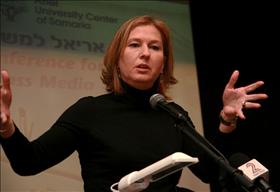On the Campaign Trail
Livni Prime Ministerial Priorities: No Core Curriculum, No Funding.
Livni shared her thoughts at the “Israel 2021 Conference” and in an interview with the newspaper The Marker. Hiddush CEO Rabbi Regev welcomes her comments: “If Livni can fulfill her promise, there can be true social justice.”
05/09/2011 13:48
Tags: Tzipi Livni · Army Exemptions · Kadima · Core Curriculum · Social protest movement

Chairman of the opposition, MK Tzipi Livni at the Ariel University Center
Kadima Chairwoman Tzipi Livni says that two her first priorities as prime minister would be to require national service, civil or military, for all citizens as well as setting aside funds for general education core curriculum classes. Livni’s comments were made at the “Israel 2021 Conference,” an event sponsored by The Marker newspaper on September 4th at the Academic College of Tel Aviv-Jaffa. Livni expressed these desires first in her speech at the conference and then later in an interview with the sponsoring news outlet.
Livni said that she “believes that only after elections will there be a change. There is no way in the world that this government will be able to make the dramatic changes required. An election needs to take place. The [social] repairs required are not only based on money.”
There needs to be “equal sharing of the burdens of both security and society. So long as this major rift is not taken care of, we are only addressing symptoms,” Livni continued.
In the interview, Livni was asked if there were elections tomorrow, and she became prime minister, what three things would she do the next morning? Livni’s response: “Military, civil or national service requirements. You need some money but it’s worth it. Core [education] classes; without core curriculum, there will be no money. Core curriculum is essential when it comes to budget decisions for educational institutions. If there are no core classes, there will be no money from the hands of the government.” Her third priority was early childhood education.
With regards to a social safety net for those who cannot work, such as the elderly and disabled, Livni noted that, “There are groups [in society] that do not participate in the labor market at all; they do not contribute. I support encouraging them to join the workforce; they need to integrate.”
On the subject of compulsory service, Livni said, “Every citizen needs to contribute to the state, be it by civil, military or community service. Service must be required in order to create equality and [promote] integration. This year could be the one in which 50% of those drafted will receive immediate exemptions and the remainder will serve in the army.”
Hiddush CEO Rabbi Uri Regev warmly welcomed Livni’s remarks. Regarding the core curriculum, Regev said, “This is the first time the chairperson of a major party took a position supporting this principle which is so essential in saving the future of the Israeli economy.”
Every citizen needs to contribute to the state, be it by civil, military or community service. Service must be required in order to create equality and [promote] integration.
Regev continued: “This is further proof that we need to establish an emergency civil government to carry out and implement the demands of the current revolution. We need to save the future of the education system and the labor market. Any child that grows up without core education will have incredible difficulties finding employment.”
Regev explained that the Hiddush report prime ministerial candidates for the Labor party and their positions on religion and state shows that four candidates, including Yechimovish and Mitzna, also support budget stipulations for core education programs. Regev noted that the law exempting small yeshivas [religious high schools] from a core educational program was passed during the Kadima coalition government. Labor had expressed hope that both parties would know how to fix this mistake in the future.
Regev also praised Livni’s commitment to compulsory service. He noted that, “the Israeli public accepted politicians’ false promises on this, the most famous of which was Ehud Barak’s promise to fund the ‘army for all’ program. If we can fulfill this promise, it is likely to be the one to bring about real change and social justice in Israel.”
Livni also proposed to change the system of government in order to avoid political blackmail. According to her, “Every cabinet minister is in the particular favor of some sector; and the largest party in the country is busy paying off the smaller factions in order that they will remain in the coalition [government]. This method gives preference to certain sectors, not the middle-class, working population that wants to live here; those people whose children should receive a good education because they will stay here even in the most difficult circumstances.”
On Saturday night, Livni told Channel 2 that there are good reasons why there were no ultra-Orthodox people or settlers at recent social protest demonstrations. These sectors, she argues, receive the most government funding and, therefore, have no reason to protest.
“The protesters come from sectors of society that do not enjoy government benefits and are really in distress,” Livni continued. “We must tell the truth. These two sectors [ultra-Orthodox and settlers] receive funding from the government and Netanyahu due to political pressure. Their pressure will not be out on Saturday night, but rather on Sunday. Even one of their ministers is enough to force Netanyahu’s hand.”
Find Livni's comments in Hebrew here, in The Marker.